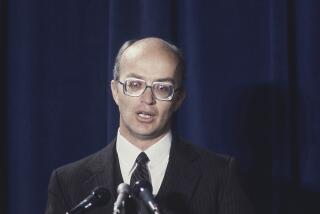Reagan Expected to Name Hodel as Interior Secretary
WASHINGTON — President Reagan intends to nominate Energy Secretary Donald P. Hodel to succeed William P. Clark as secretary of the Interior, and the President’s staff has suggested that Hodel be replaced by White House personnel director John S. Herrington, Administration officials said Wednesday.
However, Reagan declined in his nationally televised press conference Wednesday night to confirm the Hodel nomination or any other prospective change in his Administration. “I ain’t talkin’,” the President said with a grin. “I’ll tell you when we’ve made a decision.”
Reagan’s decision on whether to nominate Herrington, a former Walnut Creek, Calif., attorney, will depend largely on whether he decides to revive the move to abolish the Energy Department and merge it with Interior--something he had promised to do during his 1980 presidential campaign-- the officials said.
“Herrington doesn’t know anything about energy but he’s good at personnel management and could help merge the two agencies,” said one White House aide, who asked not to be identified. Another official said that senior presidential advisers had decided that Herrington, 45, should be nominated and the two departments merged but that they were “floating” the idea publicly as a “trial balloon” to determine the extent of congressional opposition.
The nomination of Hodel, expected to be announced this week, will be just one of several major job changes as Reagan prepares for a second term. Hodel was strongly recommended for the post by Clark, a longtime Reagan confidant who is resigning to return to his California ranch.
Hodel, a 49-year-old Oregonian, has long been an advocate of nuclear power and rapid energy development but has managed to maintain a cordial relationship with environmentalists, despite their opposition to his policies. He served as undersecretary of the Interior under the controversial James G. Watt before Reagan appointed him to head the Energy Department two years ago.
Meanwhile, Treasury Secretary Donald T. Regan--designated by the President on Tuesday to become his new chief of staff in a surprising job swap with James A. Baker III--met for the first time Wednesday with senior White House officials and announced that he wanted to talk with each of them separately before deciding on major changes.
One of the first senior aides he met with was Craig L. Fuller, the President’s Cabinet liaison officer, who said that he wanted to “explore opportunities” for employment in the private sector. Fuller, 34, a Californian highly regarded at the White House for, among other things, his ability to get along with all the competing power factions, said he told Regan that he would stay on at least through the staff transition.
But Fuller, just one of several high-ranking presidential aides expected to depart as Regan brings in his own team and management style, joined many other White House officials in applauding the Regan-Baker job swap.
“I really think the chief-of-staff change was masterful,” Fuller said. “Without losing continuity, the President has managed to inject new energy into the White House. Regan will bring in discipline. He’ll be a shot in the arm.”
Another Reagan adviser, speaking anonymously, said that “Baker’s been burned out for over a year” at the White House but “his juices are really flowing” at the prospect of becoming the new Treasury secretary.
Other present and former Reagan advisers predicted that at least two White House officials will gain more influence with the President because of the Baker-Regan swap. One is national security adviser Robert C. McFarlane, because so many other senior officials are departing and Reagan has increasingly depended on him. Another is congressional liaison official M. B. Oglesby, because he will be filling a void created by the departure of Baker, regarded as an expert legislative lobbyist.
Baker’s departure, expected sometime in mid-February, and the planned departure this spring of Deputy Chief of Staff Michael K. Deaver will mean that the President no longer will have a seasoned political expert at his side. Regan, a Wall Street stockbroker, had not been involved in politics before being named by Reagan as Treasury secretary in 1981.
“The President doesn’t need a political expert any more. He’s run his last reelection campaign,” said one White House official, asking not to be identified. “From now on, politics means dealing with Congress.”
At his press conference, Reagan was asked how he felt about the fact that so many top advisers were either leaving the Administration or changing jobs. The President replied, with specific references to Clark and Deaver, that he had known all along that they did not want to stay through a second term.
More to Read
Get the L.A. Times Politics newsletter
Deeply reported insights into legislation, politics and policy from Sacramento, Washington and beyond. In your inbox three times per week.
You may occasionally receive promotional content from the Los Angeles Times.











